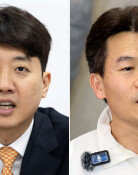Fast track promotion of chaebol scions
Fast track promotion of chaebol scions
Posted January. 09, 2015 07:38,
About eight years ago when I was a financial editor, I had a chance to meet a high-level executive who was the third-generation offspring of a conglomerates owner family. The young executive in his 30s mostly talked down to an accompanying senior executive who seemed much older than him. I talked about this occasion to a junior reporter and he said, He behaved pretty well, compared to other children of business owners. Some of them treat employees as if they were their own servants. There have been many gossips around Cho Hyun-ah, who stepped down as a vice president of Korean Air Lines over a "nut-rage" incident.
How come some of the third- and fourth-generation owners came to have such sense of self-entitlement and supercilious attitude, as seen from the case of the Korean Air heiress? The second-generation offsprings of conglomerate owner families have seen struggles and challenges of their fathers as a founder of business when they were young. However, the third- or fourth- generation members, who were born with silver spoon in their mouths and entrapped in "their own castle" from early childhood, are likely to develop distorted concept of the "chosen people." Still, denouncing the offsprings of chaebols all together must be refrained from as some scions of chaebol families behave well and observe good manners.
The recent statistics show that 32 members of the third and fourth generation from the top 30 family-run conglomerate owner families worked for 3.5 years before becoming an executive. Shinsegae Vice Chairman Chung Yong-jin and Vice President Chung Yoo-kyung, and Hanjin Heavy Industries & Construction Senior Managing Director Cho Won-gook and other chaebol offsprings started their career from an executive position, which is like a star in the sky for normal employees to achieve. Hyundai Department Store Chairman Chung Ji-seon and Vice Chairman Chung Kyo-seon moved to the managerial executive positions within one year after joining the company. The heirs of major conglomerates, such as Samsung Electronics Vice Chairman Lee Jae-yong (9.4 years), Hyundai Motor Vice Chairman Chung Eui-sun (5.8 years) and LG Executive Director Koo Kwang-mo (8.3 years), took a longer period to reach a senior managerial position than their peers.
Rapid promotion of chaebol scions cannot be criticized. However, the losses outweigh the gains when putting unexperienced and untested chaebol offsprings at high-level managerial positions too early. In the past, some conglomerate owners sent their children to other companies after finishing their education to let them learn about business management from the bottom for several years. After young scions joined the family-run company, the founder let them experience and learn core business of the company while working as a low-ranking employee for a certain period. From the "nut-rage" incident, conglomerate owner families must learn valuable lessons about the participation of their offsprings in management and fast tracking up the corporate ladder.







